Blog posts tagged apple
Why smaller retailers should give Apple Pay the cold shoulder
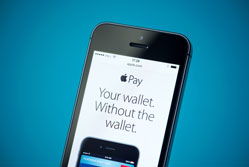 When Apple Pay arrived in the UK this summer, it was surrounded by an awful lot of buzz. At launch, it was already supported by over 250,000 retailers and many mainstream banks
When Apple Pay arrived in the UK this summer, it was surrounded by an awful lot of buzz. At launch, it was already supported by over 250,000 retailers and many mainstream banks
But little, if anything, was said about how this new payment option will affect smaller independent retailers - nor how they might use the technology to drive growth.
While there is an opportunity to benefit from this increase in mobile payments, it doesn't lie completely with Apple's way of doing things. Read on and I'll explain why.
Lacklustre Apple Pay adoption
Apple Pay has been available in the US for around a year. However,
Gallup research found that only 21% of iPhone 6 owners used their device to process Apple Pay transactions.
What's more, according to Pymts.com, 60% forgot about the service after using it for the first time.
Here in the UK, Apple Pay is expected to enjoy more rapid uptake because we're much further along in the use of near field communication (NFC) and contactless payments. But will it be rapid enough?
Not all equipment supports Apple Pay
It's certainly not safe to assume that every retailer already has hardware that supports Apple Pay.
Equipment that will work with Apple Pay is known in the industry as a 'standard payment encryption device' that supports NFC. Businesses without this equipment will need to upgrade in order to accept Apple Pay.
There's also a disparity between Apple Pay in-store and Apple Pay online.
Take Shopify. This popular online shopping platform allows retailers to set up an online shop to process sales, manage product listings and process payments - including those via Apple Pay.
But, currently, the hardware and credit card readers that Shopify supplies to stores do not accept Apple Pay.
There's a cap on transaction size
The cap for contactless transactions - due to rise to £30 in September - is another hurdle. This limits the ability of consumers to pay for larger transactions via Apple Pay, lessening adoption and usage.
What's more, to accept higher-value payments, retailers will need to spend money to invest in terminals enabled with 'consumer device cardholder verification method' (CDCVM) technology.
CDCVM adds an extra layer of security to mobile payments. As it's supported by payment card networks, it removes merchants' liability for fraud when used for Apple Pay transactions.
Together, these challenges emphasise why independent retailers should focus less on supporting Apple Pay and more on their overall mobile strategy.
With global mobile commerce predicted to reach $298bn next year - and more than doubling to $626bn by 2018 - the main challenge for retailers is making sure the shopping experience they offer is designed with smart phone users in mind.
The traditional mobile shopping experience involves cramming a typical online store into a small screen. This doesn't work well.
A custom-designed m-commerce site is essential, as is a smooth checkout process. Requiring mobile shoppers to enter sensitive information like credit card numbers into complicated forms isn't popular with consumers.
This is where mobile payment solutions like Apple Pay, PayPal, and Google's Android Pay come into the picture. The secure, single-touch pay button provides an easier way for people to check out via the mobile web and apps.
Fewer taps and screens means increased sales.
Loyalty cards coming soon?
Looking down the road, Apple will begin supporting the addition of retailer's loyalty cards to a user's Apple Wallet. This feature will also be available with Android Pay when it enters the UK market.
In the US, vertical markets like travel and hospitality have enthusiastically embraced new mobile capabilities.
For example, Marriott Hotels allows guests to use Apple Pay for check-in, thus bypassing the queue. You can also use it to instantly pay for dinners and drinks by the pool (there's no spending cap in the US).
Other hotels are rolling out technology that allows a guest to use their smart phone as a room key. This eliminates the lost card scenario, appealing to the mobile-centric generation.
The key point for retailers is that consumers use different mobile devices, have different shopping habits and choose different ways to spend their money. They need to support mobile payments across all devices, not just Apple Pay. That's the best way to maximise the opportunity for increased sales.
Copyright © 2015 Henry Morland, Chief Product Officer at Brightpearl.com.
How I run a multimillion pound business from my iPad
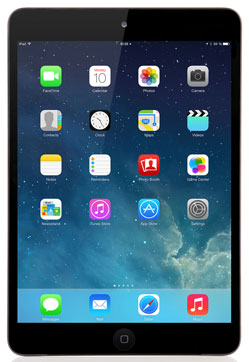 In 1977, DEC's Ken Olsen said there was "no reason for any individual to have a computer in his home."
In 1977, DEC's Ken Olsen said there was "no reason for any individual to have a computer in his home."
In 1995, 3Com's Robert Metcalfe predicted that the internet would soon go "spectacularly supernova" and collapse entirely.
In 2007, Microsoft's Steve Ballmer said that "there's no chance that the iPhone is going to get any significant market share."
People are spectacularly wrong about tech all the time. Many people still insist you can't run a business from a tablet or mobile device, for example.
Sure, they've got iPads, but they're used for playing Candy Crush and watching last night's Mock the Week on the commute. It's nice that you can check your emails, but when it comes to serious, business-critical work, the iPad just isn't up to the job.
Or is it?
In fact, people (including me) are already running entire companies from tablet computers. In many respects, it's easier than hauling yourself into the office and sitting at your desk. Why?
Working practices have changed
Flexible working: it's the new norm. While it's often thought to be a millennial thing - and sure, Gen Y does love working from coffee shops, trains, planes, and everywhere else in-between - the truth is that people have always wanted to do it. It just hasn't always been viable.
Employees now have the right to request flexible working, and - better yet - the ability to actually make it happen.
Cloud technology, along with ubiquitous wireless access, has made it possible to work while keeping an eye on the kids, during a conference (look, those things are long, and you might as well get something done), or commuting on a train.
And tablet computers make it even easier for entrepreneurs like me to take their workspace with them wherever they are.
How does it compare to being in the office?
The variety of apps available through the cloud means the difference between being in and out of your HQ is negligible. And where it is different, it's usually better.
All I need is an internet connection and I have access to all the information I need to run my company regardless of where I am. I can, in theory, do everything from my smart phone, but I prefer to use my tablet.
I have a keyboard which makes drafting lengthy emails easy, I can make calls via Skype, classic software like Microsoft Office makes writing proposals a breeze, and mobile access to customer relationship management systems (like PipeDrive) ensures I can watch our revenue stream on the move.
Apps like Citrix Sharefile allow me to access documents offline. When I don't have mobile internet and aren't near a Wi-Fi hotspot, this is invaluable. And project management tools like Slack make instant group communication a simple, effortless undertaking from any mobile device.
So thanks to the cloud and the range of business apps now available, I can (and do) run my business from my iPad just as easily as if I were in the office.
The office, of course, is still there, but this flexibility means I can be just as productive wherever I am – whether that's en-route to a meeting, checking in with the office when I'm abroad or working from home.
Copyright 2015 © Simon Osman, CEO of iFollowOffice
- Flexible work arrangements: how the cloud can help
- Yahoo! Is this the end of homeworking?
- Homeworking FAQ
Image: Denys Prykhodov / Shutterstock.com
Is Apple losing its way? (And what can this teach you?)
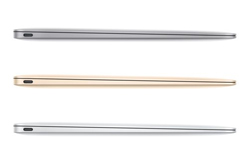 For years, Apple has represented innovation done right. What sets the tech giant apart from the rest is that its innovation was designed on the basis of user experience
For years, Apple has represented innovation done right. What sets the tech giant apart from the rest is that its innovation was designed on the basis of user experience
Steve Jobs was famous for this quote about his design approach: "You've got to start with the customer experience and work backwards to the technology. You can’t start with the technology and try to figure out where to sell it."
That approach has delivered success for Apple time and time again. But now, I think Apple might be messing with this tried and tested formula.
Where’s the charger gone?
Apple recently released its new MacBook. As usual, the company had lofty ambitions when designing this new bit of kit, claiming it ‘set out to do the impossible’.
But I think this latest MacBook innovates for the sake of innovation.
For instance, a ground-breaking feature used on other Apple laptops is the MagSafe charger. This magnetic connector was used to hook the charger up to your laptop.
Because MagSafe uses magnetism to hold the charging cable in position, it pulls out of the socket relatively easily if tugged. And that means if someone trips over your cable, your laptop is less likely to end up crashing to the floor.
I believe there are two questions to ask here: did Apple need to remove the magnetic charger? And if so, why?
Always thinner, always lighter
Apple wanted its new MacBook to be thinner and lighter. It appears to have removed the MagSafe connector because it was too big.
But why does the MacBook need to be thinner? Doesn’t the MacBook Air already do a good job as an ultra-light, ultra-thin computer?
With the loss of its MagSafe connector, Apple has innovated for the sake of innovation. It’s become obsessed with size and weight, rather than staying focused on the overall customer experience
And this leads us to the lessons we need to learn as business owners. Innovation for the sake of innovation has toppled many businesses at their peak. Here are three examples.
1. The new Coke
In 1985 Coca-Cola was trying to win the Coke-Pepsi war.
Its bright idea? Change the much-loved Coca-Cola formula and replace it with the ‘new Coke’. Cue an enormously negative consumer reaction and a firestorm of protest.
Coke’s original formula was rebranded as ‘Coca-Cola Classic’ and reintroduced less than three months later. New Coke hung around until 2002, but only accounted for a tiny proportion of the company’s sales.
Quite simply, Coca-Cola failed to understand what the drink meant to its customers.
The company focused on taste, smell, design and branding, but failed to understand that Coca-Cola meant far more to people. Coca-Cola was an experience.
Still, the company realised when it had made a mistake and learnt the lesson. Today, you’ll notice that Coke marketing often focuses on the experience of drinking Coca-Cola.
2. Windows Vista
Many of us had first-hand experience of the widely-despised Windows Vista.
Microsoft trumpeted it as a revolutionary new operative system, but it received poor reviews. InfoWorld rated it number two in tech’s all-time 25 flops.
Vista probably helped to drive PC users towards Apple computers. Indeed, Apple capitalised on the opportunity with its 'I'm a Mac' advertising campaign.
Microsoft has since begun to learn that customers look for an experience over features or 'innovation'. For instance, one video that heralds the release of Windows 10 uses the word ‘experience’ over 20 times.
The proof will be in the pudding, with Windows 10 due later this year. It could be Microsoft’s opportunity to bounce back, hitting Apple where it hurts.
3. Samsung and the Galaxy 6
The Samsung Galaxy 6 smart phone is new, but has Samsung made a mistake?
Previously, Samsung and its customers would brag to Apple users about the ability to add hardware features to their smartphones – something you cannot easily do with Apple products.
Samsung customers are proud that they can easily add memory and replace the batteries in their handsets.
Yet for some reason, Samsung has removed these features from its new Samsung Galaxy 6. Its created a ‘static’ phone, like the Apple iPhone. This creates two problems:
- Some loyal Samsung customers are moving away from the brand, seeking alternative smart phones with upgradeable memory and replaceable batteries.
- Apple customers don’t generally stick with Apple because of the hardware features. They love the software features, choosing to stay with Apple because they love how simple and easy to use the iPhone is.
If Samsung customers desert the company in greater numbers, the company could find itself losing market share as well as loyal fans.
From peak to average
Many great companies have become average at the peak of their success.
Confident and buoyed by success, they decided to innovate for the sake of innovating, rather than staying focused on customer experience.
Every business owner, big or small, should learn from the mistakes of these giants. If they can suffer from ‘over innovation’ then imagine what it could do to your business.
Whenever you think about launching a new product or updating an existing service, think about your customers. What do they want? What is the experience like for them?
Will the new MacBook herald the decline of Apple? In time, we’ll see - but in my opinion, it could. You read it here first!
Dominic Kitchin is director and founder of Saxonbury & Kent.
Apple iPhone 5s and 5c: what businesses need to know
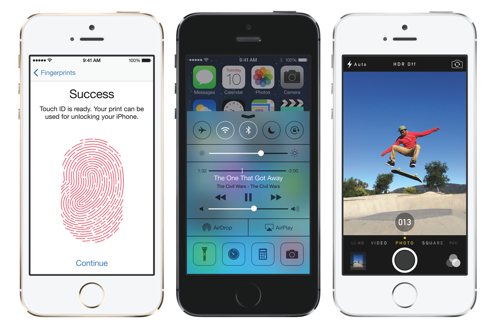
In what has become a traditional September event, Apple last week announced the latest additions to its iPhone range.
If you're in the market for a new business mobile, here's our quick guide to the new iPhones:
- Apple has announced two new models. iPhone 5s is a significantly improved version of its popular iPhone 5. The new kid on the block is iPhone 5c, which is a tweaked version of the iPhone 5 in a new coloured case.
- Prices are going up slightly. To buy iPhone 5s outright will cost £549 — £709. iPhone 5c is cheaper, at £469 — £549, but it's hardly a low-cost option. If you get one on a mobile contract then it will cost you less up front.
- iPhone 5s gets some significant upgrades compared to the current iPhone 5. The camera is better and there's a fancy new 64-bit processor which should make it run much faster than previous iPhones.
- There's a new fingerprint sensor built into the home button of iPhone 5s. This will allow you to unlock the handset and authorise purchases from iTunes and the App Store using your thumbprint. (More on this in a forthcoming blog post.)
- When you buy a new iPhone, you'll now get Apple's Pages, Keynote and Numbers apps included. These apps are Apple's mobile equivalents to Microsoft Word, PowerPoint and Excel and could well make you more productive on the go.
- You'll also get Apple's redesigned iOS7. This is the latest version of the operating system that runs on your iPhone. It has a new 'flat' design and some nice features, like a tool called AirDrop that makes it easy to share files with other iPhones.
Should you buy a new iPhone?
It's been a while now since any new smart phone has offered much more than incremental improvements on earlier models. And it's a similar story with iPhone 5s and 5c. Sure, the fingerprint reader is neat and other improvements sound welcome.
However, if you already own a relatively recent iPhone (a 4s or 5) then there's no compelling argument here to upgrade, unless you've filled your current handset to capacity.
Owners of earlier iPhones will probably find they're getting a little long in the tooth by now. In that case, upgrading to one of the new models probably isn't a bad move.
Similarly, if you're considering buying your first iPhone then now is a good time, because it'll be a year or so before another improved model is announced.
In all cases, unless you're set on having a colourful iPhone or the price difference really matters, you'll be better off opting for the 5s over the 5c. It's much more powerful, has much better features and is likely to last you longer as a result.
Remember the competition
Don't let all the buzz around the new iPhones blind you to competing handsets. While Apple arguably offers the most integrated and simple user experience, other manufacturers offer smart phones that you might find more suitable — especially if you're not already tied into Apple's way of doing things.
CNET has a good comparison of how the iPhone 5s and 5c stack up against competing handsets from HTC and Samsung. Suffice to say, if Apple isn't your thing, there are plenty of powerful alternatives out there.
iPhone 5s will be available from Apple on 20 September. You can order iPhone 5c now. Learn more >>
Got a dodgy iPhone charger? Get it replaced for less
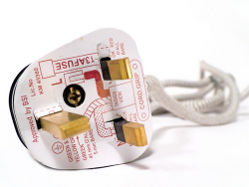 Apple has announced a charger replacement programme for people who use third-party chargers to juice up their iPhones and iPads.
Apple has announced a charger replacement programme for people who use third-party chargers to juice up their iPhones and iPads.
The announcement comes in the wake of the tragic death of a Chinese woman who was electrocuted when she answered a call on her iPhone.
Reports have blamed a third-party charger, although Apple hasn't acknowledged any connection between the incident and its recent announcement.
Trade in your chargers
Under the new scheme, from 16 August you'll be able to walk into an Apple store with your third party iPhone or iPad charger and walk out with an official Apple model. You'll still have to pay, but it'll cost £6 or so instead of the normal £15.
You'll have to provide the serial number of your iPhone or iPad, and the programme is limited to one charger for each device.
A decent discount
Given the usual price of official Apple chargers, this programme offers a decent discount. For peace of mind, it's probably a good option if you're worried about a charger you own.
Unoffocial chargers and mains adaptors are often appealing, because they cost so much less. But while replacements from reputable manufacturers generally meet reasonable standards of safety, this incident highlights that buying a cheap replacement can be a false economy. If you're unlucky, it could even cause you harm.
Why the iPad mini is like a packet of crisps
 When you were growing up, did you ever do that thing where you put empty crisp packets in the oven? (Under parental supervision, of course.)
When you were growing up, did you ever do that thing where you put empty crisp packets in the oven? (Under parental supervision, of course.)
Do it right and the packets would shrink to a fraction of their former size, leaving you with a tiny but ultimately pretty useless crisp packet.
For some reason, that's the image that came to mind when I first saw iPad mini, the latest addition to Apple's iPad range. It's like a normal iPad that's shrunk.
Announced on Tuesday, iPad mini has a 7.9" screen, making it a bit bigger than the iPhone 5 and a bit smaller than the 10" iPad 3 (could this now be called the iPad maxi, or does that sound too much like a feminine hygiene product?).
Is iPad mini overpriced?
Introducing iPad mini is a logical move for Apple. Recent months have seen a number of high-profile 7" tablets hit the market, including Amazon's Kindle Fire HD and the Google Nexus 7. Anyone who wanted a smaller tablet simply hasn't had an Apple product to consider.
And there definitely is a market for these compact tablets. They can be useful for super-portable computing, because they're big enough to use productively but small enough to squeeze into an already-full bag or even slip into a suit pocket.
But with iPad mini prices starting at £269, Apple risks pricing itself out of a lot of sales. Those competing tablets both come in at £100 or so under iPad mini's base price. And they both have better screens - which is surprising when you remember that the big wow factor of the larger iPad is its incredibly crisp Retina display.
Of course, iPad mini is bound to still have Apple's legendary build quality, and will run the vast range of existing iPad apps. But it's not a guaranteed success.
Paying for the name
One of the reasons the larger iPad has done so well is that Apple was the first company that got tablet computers right. There had been other attempts before, but nobody had created a tablet computer that was as stylish, practical, simple and genuinely useful as the iPad. (The same was true of the iPhone and its touch screen.)
But things have moved on since then. I don't think Apple can simply shrink its iPad, slap a big price tag on it and assume people will come running.
What's more, people who've already bought into the Apple way of doing things probably already have an iPhone or an iPad. Will they really want another touch screen device that's just a slightly different size?
I'm not convinced. If it was £100 less, Apple would sell out in moments. It would make a big dent in the tablet prospects of Amazon and Google. Yet at £269 it looks like an expensive gadget, and many businesses will struggle to justify it over its competitors.
How about you? Could you use an iPad mini in your business?
|
You can pre-order the iPad mini direct from Apple from 26 October. Amazon's Kindle Fire HD is available now from £169. The Google Nexus 7 costs £189.99. |
Does Samsung care about its older customers?
Over the last day or so a Samsung video has emerged that pokes fun at Apple and its customers.
It shows a bunch of people waiting in line outside a shop to buy a new mobile phone. To pass the time, they discuss the phone's exciting new features, like a connector that's 'all digital' and 'the coolest adaptors'.
The ad is clearly aimed at Apple, the tone is of friendly mockery, and it makes some good points. Many new iPhone features have been standard on Samsung phones for some time.
But around a minute in, one member of the queue reveals that - shock, horror! - he's not there to buy a phone himself. He's just saving a spot for his parents.
"Thanks for holding our spot," says his coffee-cup-clutching mum, while a bearded, grey-haired chap (dad, presumably) looks on with a benevolent smile.
The implication is clear: the iPhone is for oldsters. If you're hip, with it and under 30, a Samsung phone is way cooler.
Just a bit of lighthearted fun, or casual ageism? I can't quite decide, but in this day and age it seems patronising to suggest older people are behind the times with technology and have a tendency to make poor purchasing decisions.
We've mentioned before how research shows the stereotypical view of older computer users isn't very fair or accurate. Yet in the process of having a dig at its biggest rival, isn't Samsung needlessly reinforcing those stereotypes?
Watch the video here and decide for yourself:
Buying an Apple or Samsung phoneIf you want to buy a new phone without a contract, you can order iPhone 5 on the Apple website (from £529). Samsung's Galaxy SIII is available from online retailers like Simply Electronics and Misco (£400 - £500) For a phone on a new contract, both handsets are available from networks like Orange, T-Mobile and Vodafone. |
What to expect from iPhone 5 ... and the phones that already deliver it

A queue outside a London Apple Store for iPhone 4. (Image: Eddie Shannon on Flickr.)
Unless one of the world's most valuable companies is trying to mislead us all, Wednesday will see Apple unveil iPhone 5. The latest in its line of smart phones, the shiny, desirable object will almost certainly prompt long queues at Apple stores and deliver a surge in sales. Shareholders must be rubbing their hands with glee.
Rumours abound about what new features iPhone 5 will have, and some of the less outlandish suggestions seem pretty much guaranteed. We look at three top feature rumours and ask whether they'll really make a difference to how your use your phone. We've also rounded up some phones which already offer them.
1. A bigger screen
Although smart phone screens have grown larger over the last couple of years, Apple has stuck with a 3.5" screen for its iPhone. Expect that to change for iPhone 5, which looks likely to offer a 4" screen that will be taller, yet no wider. It'll allow more space for apps, email, websites and maps, without making the phone harder to use one-handed.
Is it worth having?
Probably. A larger screen may appeal to existing iPhone users, and taller-but-not-wider proportions would keep the phone more pocket-sized and easy to work with one hand. However, big screens often mean reduced battery life, and can an extra half inch really make that much difference?
Other options
There are heaps of smart phones out there with bigger screens. But if you really want a phone with a large screen, why hold back? The Samsung Galaxy S3 has a huge 4.8" screen, which is certainly handy for viewing websites and documents. It costs around £450 to buy outright, or you can get it for £25 when you sign up for a £36 a month contract with T-Mobile.
2. A new connector
Apple's range of iPods and iPhones uses a long, thin connector for charging and transferring data. But to keep the phone as small as possible, it looks like the company will move to a smaller connector with iPhone 5. This will frustrate existing iPhone owners, who will - presumably - have to ditch all their accessories if they decide to upgrade.
Is it worth having?
No. Engineering benefits aside, any change to the connector will simply spell inconvenience for existing iPhone owners who are upgrading. It also means none of the super-cheap iPhone cables you can currently find online will work.
Other options
Apple seems to take pleasure in forcing its own standards onto things like connectors, yet there's a perfectly good universal connector out there. It's called Micro USB, and you'll find it on many other handsets including the Nokia Lumia 800. This mid-range Windows Mobile handset is available for free with a £30 a month Three Mobile contract, or for £300 outright.
3. A faster processor
Today's smart phones are super powerful. Pretty much whichever one you buy is likely to have more than enough oomph for web browsing, playing games and so on. I've had an iPhone 4S for months and it's still snappy with no sign of slowdown. However, many experts expect iPhone 5 to come with a quad-core processor, which should make the phone faster when you're running several apps.
Is it worth having?
At the moment, there's little benefit because few apps require all that processing power. Fast forward a year though, and you might be glad of the power - historically, the iPhone's new features have only been fully exploited over time.
Other options
There's no shortage of quad-core smart phones on the market at the moment. The HTC One X is a monstrously-powerful handset that's received excellent reviews. It's free with a £36 a month T-Mobile contract, or you can get it with no ties for £419.
Apple's box of tricks
The big unknown with any Apple launch is, of course, which of the more outlandish rumours are true. Could we see a phone with a built-in chip that allows you to pay for things, fingerprint recognition ... or something that nobody has guessed yet? Find out on Wednesday.
Now is when the tablet comes of age for business
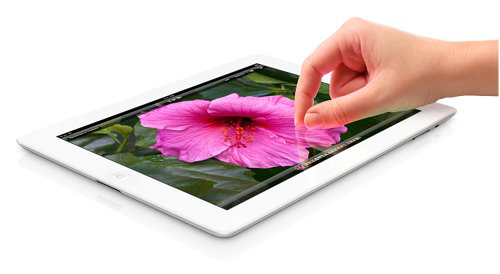 Last week’s launch of the new iPad was met with the excitable coverage that inevitably accompanies any Apple product announcement. But beneath the hype, does the new iPad herald wider business adoption of tablet computers?
Last week’s launch of the new iPad was met with the excitable coverage that inevitably accompanies any Apple product announcement. But beneath the hype, does the new iPad herald wider business adoption of tablet computers?
In November 2011, a study of IT adoption trends among UK small and medium businesses (SMEs) found 37% were using tablet computers. Another 37% said they were planning to purchase them.
So there’s a definite enthusiasm for and move towards tablet computers like the new iPad. And perhaps the emergence of cheaper competitors will accelerate this trend.
Why choose a tablet for business?
The real beauty of tablet computers is their portability. Their smart design, integrating everything into one neat, light panel, makes them ideal for use on the move.
They’re particularly useful for visual tasks, like running presentations or referring to spreadsheets, websites or designs when visiting a client. Many tablets let you take notes using a stylus or digital pen. Some will even convert your handwriting into type.
Tablets vs. laptops
Tablet computers tend to cost the same as, or a bit less than laptop computers. But can you really replace a laptop with a tablet? And would you want to?
Tablet are fun to use, at least initially. If you’re not used to using a fast, intuitive touch screen then your first days with a tablet can be really enjoyable.
However, when it comes to processing power, laptops have the edge. The latest iPad has heaps of power by tablet standards, but it won’t hold a candle to many laptops. Still, for everyday tasks that may not matter. You won’t notice a great deal of different when browsing the internet or using email.
The ergonomic issue
If you’re considering buying a tablet, think carefully about how you plan to use it. Typing on a touch screen can be awkward and may even be harmful. At least one study has found tablet users have a higher potential for neck and shoulder discomfort.
“It’s best to avoid typing for any length of time directly on a tablet computer,” warns back pain therapist Diksha Chakravarti. “It’s better to use a peripheral keyboard and stand, and remember to take regular breaks to stretch.”
Boosting battery life
A real bonus for tablet users is that the battery life of these slate-type devices tends to be much better than that of laptops. Your typical tablet computer’s battery will last more than twice as long as your average laptop’s.
This is partly due to the lower power demands of the solid state storage tablets rely upon. They also have other components specifically designed to minimise power use.
One of the trade-offs for this efficiency is in storage space. Tablets are able to hold much less data than your average laptop. Using cloud-based storage can make up the shortfall.
Indeed, tablets and cloud computing are natural partners. Touch screens lend themselves well to navigating web-based applications and you can get a whole host of business tools designed specifically for tablets.
What’s more, because these tools are hosted online (in the cloud), they put less strain on your tablet’s own storage capacity and processing power and are generally more secure, because the data isn’t stored on your easily-stolen tablet.
Should you invest in a tablet for business?
If you currently rely on a laptop as your main computer, replacing it with a tablet is probably not a good idea. Although tablets are super-portable and enjoyable to use, you’ll miss your laptop’s power, storage capacity and keyboard.
However, as a mobile device to complement your main desktop or laptop computer, a tablet can be ideal. Used in combination with the right cloud-based applications, it can seriously increase your productivity.
- Are tablet computers right for business?
- Sure, your iPad is cool. But my netbook is better for business
- iPads: they breed like, er, iPads
This is a guest post from Integral IT, a Yorkshire IT support company.
iPads vs laptops: Apple to win?
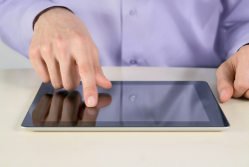 Over the years, new types of computer have come and gone. Remember the ultra-mobile PC? Or the Amstrad [email protected]? I wonder why Alan Sugar never mentions that on The Apprentice. And whatever happened to tablet computers with rotatable screens, built-in keyboards and a stylus for writing on the screen?
Over the years, new types of computer have come and gone. Remember the ultra-mobile PC? Or the Amstrad [email protected]? I wonder why Alan Sugar never mentions that on The Apprentice. And whatever happened to tablet computers with rotatable screens, built-in keyboards and a stylus for writing on the screen?
But every now and then, something comes along that does change things. And at the end of last year, a piece of news suggested that one new kind of computer is having a real impact – both at home and in the workplace.
The iPad sales success
Apple’s iPad reigns supreme in the UK tablet computer market. It accounts for almost three-quarters of all tablet sales. And perhaps most impressively, it turns out that Apple is selling more iPads than Dell is selling laptop computers.
Given that Dell is one of the world’s biggest computer manufacturers (the company claims it ships over 10,000 systems a day), that’s astonishing. And it strongly suggests that long-term, the iPad – plus other tablet computers, should anyone start buying them – could have a huge impact on what sort of computers we use and how we use them.
People are embracing the iPad enthusiastically, swapping full-spec laptops for the thin, light, super-easy-to-use Apple gadget. Who can blame them? No long waits while it starts up, no fiddly keys or buttons ... just a touchscreen anyone can use, plus thousands of apps.
It’s not a stretch to say that 2012 could see tablet computers establish themselves as the mobile computing tool of choice. Unless you need a full-size keyboard, it’s becoming more difficult to see what benefits are offered by traditional laptops for typical on-the-move tasks like checking email or reviewing documents.
Nobody wants a netbook any more
Just ask the companies which sell netbooks, the small, cheap, low-powered laptops that just a few years ago were poised to reshape the PC industry. Things don’t look great for them: sales have slumped 40%. Blame is being laid at the door of the iPad.
The argument stands up: to many people, netbooks are just compromised laptops. If you can’t type comfortably on the keyboard and you have to squint to see the screen, a tablet computer might well be a better option.
What’s more, machines like the iPad are developing fast. Will the combination of impressive hardware and versatile apps persuade more people to swap their netbook or laptop for a tablet?
Laptop makers certainly are worried. You can tell, because the big players are rushing to release ultrabooks, another type of computer which is like a netbook but thinner, more powerful and much more expensive.
These sleek machines have enough punch to replace your desktop computer, but are designed to start instantly and be small enough to take anywhere. They look great, they perform well and – although they can be expensive – they’re finding a spot in the market.
This time it’s the MacBook Air
But hold on – guess who makes the most successful ultrabook. Yep, that’s right: it’s Apple again, this time with the MacBook Air. This is the computer which pretty much defined what an ultrabook should be – and it certainly represents what other ultrabook manufacturers aspire to.
Put aside the ultrabook vs. netbooks vs. laptops vs. tablets debate. The real story might be Apple itself, and whether it can take a much bigger slice of the business IT market in 2012.
- Can you really use an Apple Mac for business?
- Should you bring your iPad to work?
- Are tablet computers right for your company?
This is a guest post from Integral IT, a Yorkshire IT support company.
There was something about Steve Jobs...
 I've just lost a brilliant, inspiring potential sales director. Here I am, a hot startup in the search space with tons of VC backing, an emerging market and offering a great salary and significant stock options and I lose to a huge American corporation.
I've just lost a brilliant, inspiring potential sales director. Here I am, a hot startup in the search space with tons of VC backing, an emerging market and offering a great salary and significant stock options and I lose to a huge American corporation.
Aren't big corporations supposed to be terrible to work for? Aren't they supposed to be nasty to their people and only attract second raters?
The corporation in question in this case is Apple. As an ardent Apple fan of four years (since the first MacBook Air) I can't even get bitter and twisted over this loss. I actually found a worthy competitor. And for the first time in my life I actually didn't mind coming second.
What is it about Apple?
Steve, you did a brilliant job of being clever more than once. Everyone is allowed to be clever once, few achieve it. But Steve, you did it time after time after time. iMac, Air, iPod, iPhone, iPad.
How?
It's in the team. Steve was a talent magnet. And a generous one to boot. Some of his key people had stock options in the range of hundreds of millions of dollars. Many middle managers are millionaires.
Whilst he was clearly becoming sicker over that last year he was neatly handing over the responsibility of the business to trusted lieutenants – the likes of design genius Jonathan Ive and logistics genius Tim Cook.
What you have bequeathed us Steve is not only brilliant products (you have to try the iPhone's new artificially intelligent assistant, Siri, it’s incredible) but a world class example of how to run a business that is capable of repeating success through talent acquisition.
What was it Lyndon Johnson said? "If you recruit someone who is better than you then you conclusively prove you are better than they." So true.
Thanks Steve.
John Straw is an expert contributor to Marketing Donut and the founder and VP of Business Development of Linkdex.
Should you bring your iPad to work?
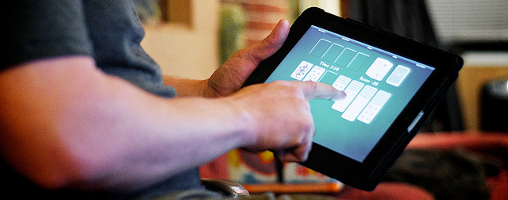
You can play solitaire on your iPad too... (Image: bark on Flickr.)
It’s impossible to deny that the iPad has been a real sales success. Apple sold 9.25m of them in the last quarter alone. It might only be a matter of time before iPads become another piece of equipment that people bring to work – just like their mobile phone.
But is there a place for the iPad in your company?
Business uses for the iPad
The iPad’s usefulness as a business tool has been questioned, not least on this very blog! But for many, it’s proving to be a revolutionary device. It’s easy to hold, easy to transport and easy to use.
It uses the same operating system and interface as the iPhone, and doesn’t bother with conventional input devices like a mouse or keyboard. You just tap, swipe and drag your fingers on the screen.
It’s down to the apps
Part of the iPad’s success is certainly down to the wide availability of apps. You can download nearly 100,000 of them, covering every category from entertainment and media to productivity and business.
It’s these apps that really enable you to make productive use of an iPad in the workplace. Here are some specific scenarios where you might want to consider using an iPad:
- For presentations. The iPad is a great tool for showing and sharing presentations – it’s portable, so you can just pull it out of your bag when you need it.
Software like Apple’s Keynote lets you import and edit PowerPoint presentations, and you can even hook it up to a monitor or projector (if you don’t mind buying an adaptor from Apple).
There are also applications available that will let you do ‘virtual presentations’ – so you can show your presentation to people on the internet.
- For working together and communicating. The iPad comes with an email app, and you can add all manner of other tools for audio and videoconferencing.
There’s a built-in calendar and address book, so it’s a good replacement for a paper planner – and the larger screen means it’s easier to read than your mobile phone.
You can also choose from a range of apps to manage your tasks, monitor projects, share files, read and post items in social networks and more.
- For working in the field. The iPad is lightweight and portable, so it’s a great companion on the road. It has the ability to connect securely to your office network using a virtual private network (VPN) connection.
- For managing your travel. I feel the iPad is unmatched as a travel companion. There are heaps of apps for managing flights and hotel bookings, checking your itinerary and recording expenses. And when you have some time to yourself (or are bored on a long flight), that big screen is perfect for watching movies.
- For doing industry-specific tasks. This depends which industry you’re in, but there are lots of environments in which the iPad can be put to work. For instance, Apple itself has replaced all its in-store product labels with iPads.
You can even use it as a point-of-sale device (like a till). Other companies are using iPads to replace printed manuals, and some schools are using it in place of stacks of books.
There are lots of other ways the iPad can be used for business. Are you considering using one in your company as well? And if your company doesn’t own its own iPads, would you be happy for staff to bring in their own? Leave a comment and let us know.
What's it worth? How to price your technology product
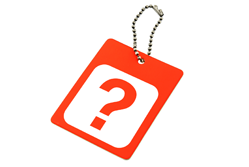
Ben Dyer of SellerDeck has been keeping an eye on how IT firms price their products. And he thinks we could all learn something from them.
Technology companies have been responsible for some innovative pricing ideas. So, if you're struggling to price your product - whether it's technology-related or not - can you take some inspiration from them?
The three 'r's of pricing
Recurring revenue rocks. Working for a software company, I know all too well the challenge of selling items that are one-off purchases. The upside is an injection of hard cash. The downside is that your sales team has to convert a fresh batch of prospects, every month.
One alternative is to aim for recurring revenue with a subscription model. You can charge a monthly fee to people who use your software, offer bolt-on extras like support and upgrades. Customers like this pricing model because the monthly cost is low, and it gives you the ability to predict the growth (or decline) of your business.
Give it away
Another option is to give your product away. This sounds mad, but can lead to huge growth.
It's called the 'freemium model'. The idea is to get people using a basic version of your service, then upsell more advanced features.
The freemium model only really works if your product has tiered levels and it doesn't cost you much to set up a new customer. It's a science all to itself - I recommend checking out Chris Anderson's blog and excellent books, Free and The Long Tail.
Two companies, two different approaches
Apple and Amazon both have numerous divisions, products and services. They also have completely different pricing strategies.
At the recent iPad 2 launch, Apple's Steve Jobs revealed that the company now makes more money from 'post-PC' purchases (iPods, iPhones, iPads) than from its traditional computers. One reason for this is the rise of third-party apps which run on Apple devices. Apple takes a slice of each one sold.
Apple has successfully blended the upfront payment and recurring service models. I would argue theirs is the best example of this type of pricing on the market. Most impressively, Apple has even managed to keep the initial payment high!
Amazon has taken a different approach with the Kindle, its electronic book reader. These come in two parts: the software, which is free for almost all platforms (including the iPad), and the hardware.
The hardware is cheap. At just £111 the price is getting close to impulse-buy territory. Many observers reckon the Kindle will be free to Amazon Prime subscribers by the end of the year.
The rationale, of course, is that most of Amazon's Kindle revenue comes from selling ebooks for people to read on the device. That's the company's fastest growing product range.
Amazon has been smart and reactive. The Kindle isn't a rival to iPods and iPads. It's complementary - so Amazon can grow its revenue too.
What could you learn from IT companies about pricing?
Sure, your iPad is cool. But my netbook is better for business.

Add a keyboard and perhaps your iPad will be more useful. (Photo: Stefan Evertz)
It's hard to deny that the iPad 2 is cool. And if you weren't one of the crazy enthusiastic punters who queued up last week to get one, demand for Apple's new gadget means that if you want one, you're probably in for a bit for of a wait.
Maybe we should all use that time to step back and ask: is the iPad actually much use for business? And, for that matter, do other tablet and slate-type devices like Motorola's Xoom or Samsung's Galaxy Tab really deserve a place in your company?
Limited business applications
I don't own an iPad, nor any other kind of slate or tablet computer. A few years back, I used Toshiba's M200 Tablet PC as my main work computer, but although it was one of the best laptops I've ever had, I rarely used the tablet features (you could fold the screen over and use a pen to write on it).
Sure, there's a big difference between Microsoft's clunky attempt to adapt Windows for a tablet device - which was running on that computer - and Apple's super-slick interface. But ease-of-use alone is not enough to establish the iPad as a must-have business tool.
The business applications I've seen for the iPad so far have been limited. I've spotted people at events using them to sign people up to mailing lists. And I can see how they'd be useful for people who need access to information but are on their feet all day. iPads could replace clipboards in warehouses, dentists' surgeries and the like.
My netbook is better and cheaper
But what about the sort of repetitive business tasks you take care of every day? Writing letters and emails. Running accounting software. Accessing your customer relationship management system.
For these sorts of jobs, my distinctly un-glamorous netbook (a cheap, cut-down laptop) is far better than an iPad. Here's why:
- It's not as small or as light as an iPad, but it's small and light enough to go everywhere with me.
- It has a proper keyboard, so I can type documents accurately and quickly.
- It has USB ports and doesn't need extra adaptors to plug into a proper monitor, so it's easier to use with my existing IT kit.
- The battery lasts about eight hours. That's probably less than an iPad, but plenty for a day on the road.
- There's plenty of space for my files and I can switch from web browser to spreadsheet to whatever in seconds.
In fact, the more I think about it, the more it seems that the only advantage that slate devices offer is that you can use them standing up. If there's a desk or space where I can sit and type at my netbook, it's the better option. Although, to be fair, I won't look as cool.
What's more, a netbook like mine is cheap. Figure £250 or so for a very capable netbook, compared to £399 for the entry level iPad.
Is it just me who can't see the point of the iPad for businesses? Do you use one in your company? Leave a comment and let me know.



